The Spring Festival, also known as Chinese New Year, is one of the most important traditional holidays in China. Every year during this period, railway stations are crowded with migrant workers returning to their hometowns. Almost all means of transportation—railways, highways, and air travel—experience a surge in passenger volume, a phenomenon known as Chunyun, or the Spring Festival travel rush.
Next, in this article, let me take you on a journey to explore the origins, traditional customs, and colorful celebrations of the Chinese Spring Festival.
2026 Chinese New Year Dates
Because the 2026 Chinese New Year falls on February 17, it marks the beginning of the lunar new year. The celebrations will last for 15 days, ending with the Lantern Festival on February 25, 2026, which symbolizes the conclusion of the New Year festivities.

Chinese New Year Calendar (2025 – 2080)
Based on the above, I have compiled the Spring Festival dates spanning 55 years, in order to provide a clearer understanding of how this important holiday is distributed across different years.
| Year | New Year Date | Zodiac Animal |
|---|---|---|
| 2025 | Jan. 29, 2025 (Wednesday) | Snake |
| 2026 | Feb. 17, 2026 (Tuesday) | Horse |
| 2027 | Feb. 6, 2027 (Saturday) | Sheep |
| 2028 | Jan. 26, 2028 (Wednesday) | Monkey |
| 2029 | Feb. 13, 2029 (Tuesday) | Rooster |
| 2030 | Feb. 3, 2030 (Sunday) | Dog |
| 2031 | Jan. 22, 2031 (Wednesday) | Pig |
| 2032 | Feb. 10, 2032 (Tuesday) | Rat |
| 2033 | Jan. 30, 2033 (Sunday) | Ox |
| 2034 | Feb. 17, 2034 (Saturday) | Tiger |
| 2035 | Feb. 6, 2035 (Thursday) | Rabbit |
| 2036 | Jan. 26, 2036 (Saturday) | Dragon |
| 2037 | Feb. 14, 2037 (Sunday) | Snake |
| 2038 | Feb. 3, 2038 (Thursday) | Horse |
| 2039 | Jan. 23, 2039 (Monday) | Sheep |
| 2040 | Feb. 11, 2040 (Saturday) | Monkey |
| 2041 | Jan. 31, 2041 (Friday) | Rooster |
| 2042 | Feb. 19, 2042 (Thursday) | Dog |
| 2043 | Feb. 8, 2043 (Sunday) | Pig |
| 2044 | Jan. 28, 2044 (Thursday) | Rat |
| 2045 | Feb. 16, 2045 (Wednesday) | Ox |
| 2046 | Feb. 5, 2046 (Tuesday) | Tiger |
| 2047 | Jan. 25, 2047 (Monday) | Rabbit |
| 2048 | Feb. 13, 2048 (Friday) | Dragon |
| 2049 | Feb. 2, 2049 (Tuesday) | Snake |
| 2050 | Jan. 22, 2050 (Saturday) | Horse |
| 2051 | Feb. 10, 2051 (Thursday) | Sheep |
| 2052 | Jan. 29, 2052 (Tuesday) | Monkey |
| 2053 | Feb. 17, 2053 (Sunday) | Rooster |
| 2054 | Feb. 6, 2054 (Saturday) | Dog |
| 2055 | Jan. 26, 2055 (Wednesday) | Pig |
| 2056 | Feb. 14, 2056 (Tuesday) | Rat |
| 2057 | Feb. 3, 2057 (Sunday) | Ox |
| 2058 | Jan. 23, 2058 (Thursday) | Tiger |
| 2059 | Feb. 11, 2059 (Tuesday) | Rabbit |
| 2060 | Jan. 31, 2060 (Monday) | Dragon |
| 2061 | Feb. 19, 2061 (Friday) | Snake |
| 2062 | Feb. 8, 2062 (Wednesday) | Horse |
| 2063 | Jan. 28, 2063 (Monday) | Sheep |
| 2064 | Feb. 16, 2064 (Saturday) | Monkey |
| 2065 | Feb. 5, 2065 (Thursday) | Rooster |
| 2066 | Jan. 25, 2066 (Tuesday) | Dog |
| 2067 | Feb. 13, 2067 (Sunday) | Pig |
| 2068 | Feb. 2, 2068 (Friday) | Rat |
| 2069 | Jan. 22, 2069 (Wednesday) | Ox |
| 2070 | Feb. 10, 2070 (Tuesday) | Tiger |
| 2071 | Jan. 30, 2071 (Saturday) | Rabbit |
| 2072 | Feb. 18, 2072 (Friday) | Dragon |
| 2073 | Feb. 7, 2073 (Wednesday) | Snake |
| 2074 | Jan. 27, 2074 (Monday) | Horse |
| 2075 | Feb. 14, 2075 (Tuesday) | Sheep |
| 2076 | Feb. 3, 2076 (Sunday) | Monkey |
| 2077 | Jan. 23, 2077 (Saturday) | Rooster |
| 2078 | Feb. 11, 2078 (Thursday) | Dog |
| 2079 | Jan. 31, 2079 (Wednesday) | Pig |
| 2080 | Feb. 19, 2080 (Tuesday) | Rat |
Each year is associated with a specific animal, known as the Chinese Zodiac. The term “Chinese Zodiac” refers to a 12-year cycle, with each year represented by one of twelve animals.
The Origins of Chinese New Year
The origins of Chinese New Year date back to ancient times, with various legends and stories explaining its significance. The most widely known is the myth of the “Nian,” a mythical beast that would emerge every New Year’s Eve to terrorize villages, destroying crops, livestock, and even attacking people. To drive away the “Nian,” people used firecrackers, red decorations, and lights, which eventually became traditions during the Chinese New Year celebrations, such as lighting firecrackers and wearing red clothing.

Additionally, Chinese New Year marks the end of the lunar year and the beginning of the new one. In ancient agricultural society, the concept of “year” was closely tied to the agricultural cycle. Therefore, the festival became a time to honor gods and ancestors and to pray for good weather, bountiful harvests, and prosperity in the coming year.
Over time, Chinese New Year evolved to incorporate more customs and celebratory practices, such as family reunions, ancestor worship, New Year’s visits, and dragon and lion dances, making it a festival that represents family unity, honoring the past, and ushering in the new year with joy and hope.
What Do People Do at the Start of Chinese New Year?
At the start of Chinese New Year, families across the country engage in a series of celebratory activities, blending traditional customs with modern ways of celebration. Here are some of the things people typically do at the beginning of the festival:
Thorough Cleaning
On the eve of the New Year, family members perform a thorough cleaning of their homes. This is not only to maintain cleanliness but also to symbolize the “removal of the old and welcoming the new,” driving away bad luck and misfortune from the past year while inviting good fortune and prosperity in the new year.

Hanging Spring Couplets and Lanterns
Every household will hang up spring couplets and red lanterns. The red spring couplets symbolize good fortune and joy, and they often carry wishes for prosperity and happiness in the coming year. The red lanterns further enhance the festive atmosphere.
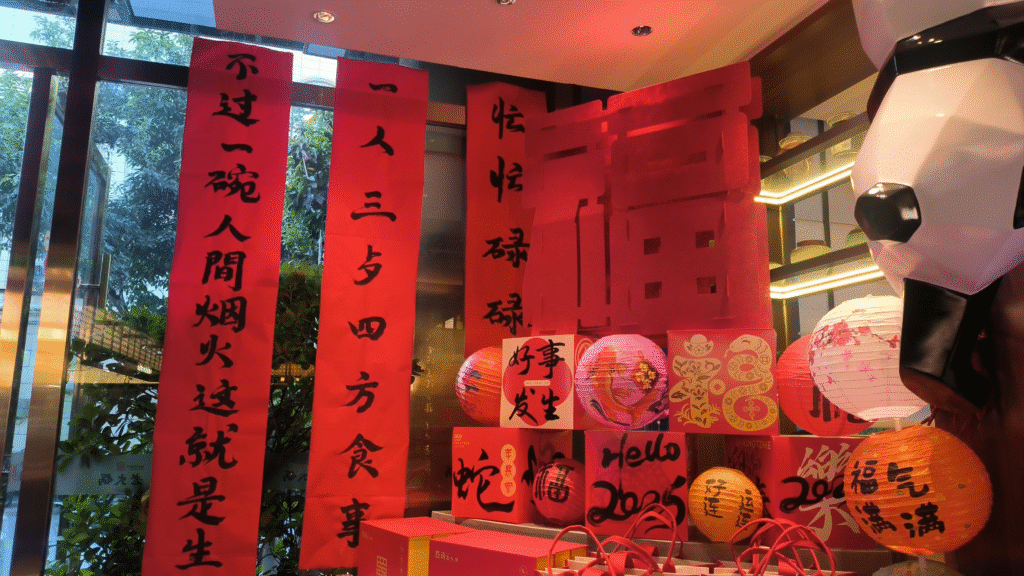
Family Reunion Dinner
The family reunion dinner on New Year’s Eve is one of the most important traditions of Chinese New Year. Regardless of where people are, many try to return home to reunite with their families and share a grand meal. The dinner often includes symbolic foods such as dumplings, rice cakes, and fish, each carrying wishes for good luck and blessings.

Setting off Firecrackers and Fireworks
Firecrackers and fireworks are an essential part of the Chinese New Year celebrations. The loud sound of firecrackers is believed to drive away the evil “Nian” monster, protecting people from harm. Fireworks, on the other hand, symbolize a bright and colorful new year, filled with hope.
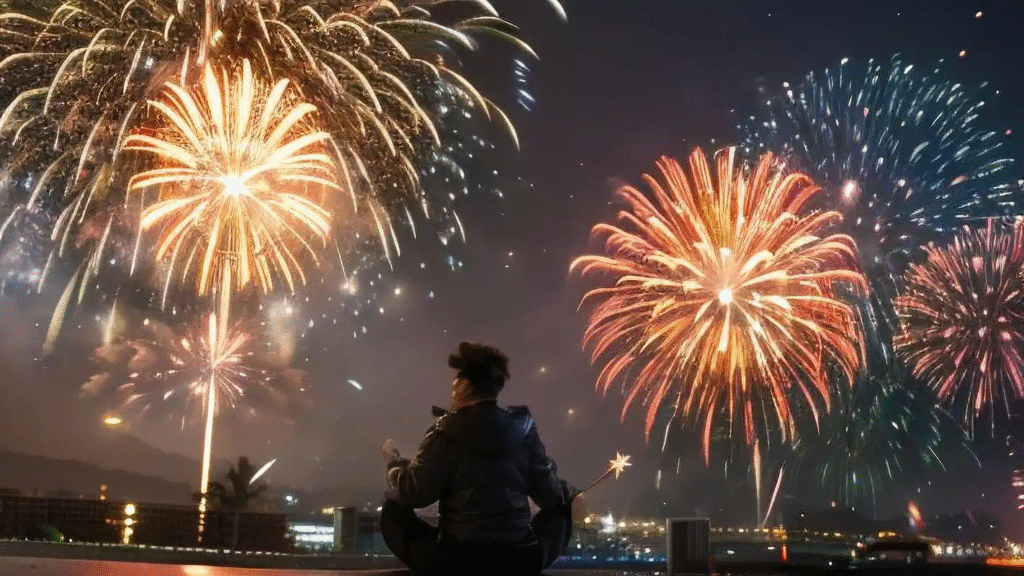
In recent years, due to growing concerns about environmental pollution, fireworks have been strictly banned in many cities during the Spring Festival. Meanwhile, rural areas still allow them with few restrictions.

This contrast has created two very different holiday atmospheres—quiet apartment buildings in the city versus lively, firework-filled nights in the countryside.
New Year Greetings and Red Envelopes
During the festival, people visit friends and relatives to exchange New Year greetings and well-wishes. Elders particularly give red envelopes (containing money) to children and younger family members, symbolizing good luck and wealth. This custom also conveys care and blessings for the younger generation.
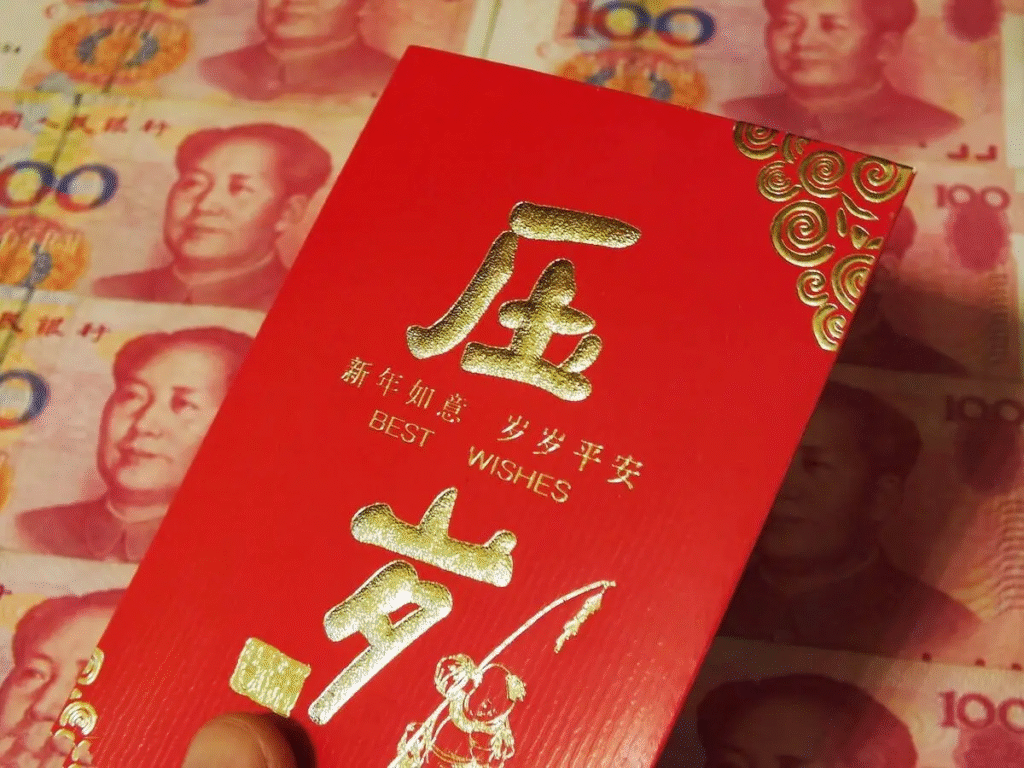
The amount of money given in red envelopes also varies depending on the region. In poorer areas, it’s usually just a few dozen yuan, while in big cities, it can reach several thousand or even tens of thousands. On average, though, most people give around 100 yuan.
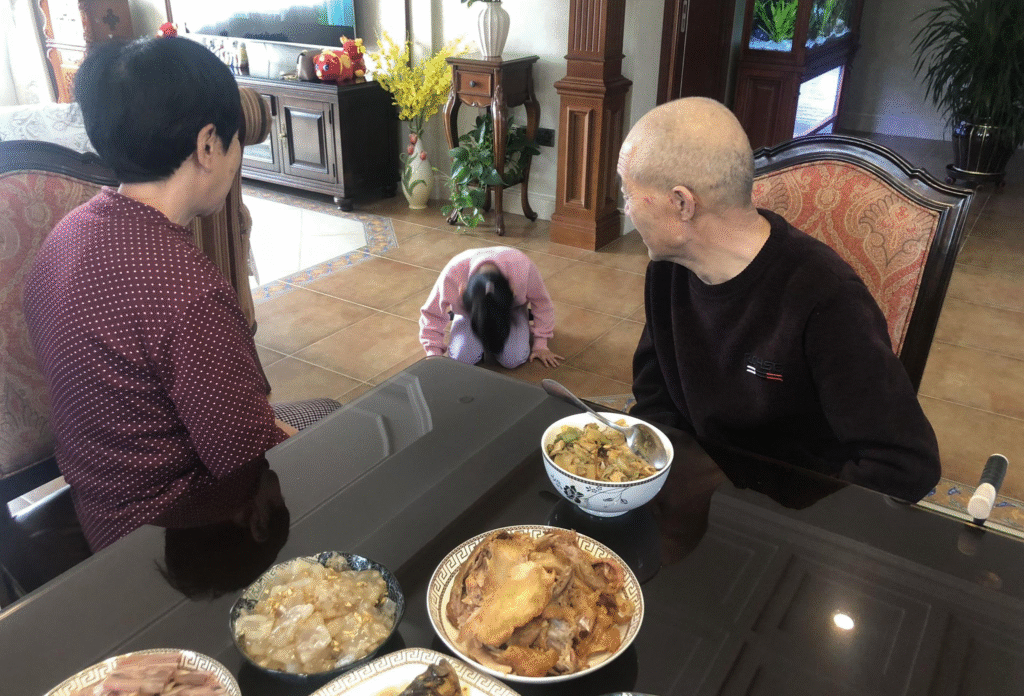
In rural areas, it’s also common for younger family members to kneel and bow before receiving their red envelopes—a gesture of respect that has been passed down for generations.
Ancestral Worship and Praying for Good Fortune
Many families perform ancestral worship during the New Year, showing respect and reverence for their ancestors. They also pray for favorable weather, abundant harvests, and the health and well-being of their family members in the coming year.

During the Spring Festival, ancestor worship embodies several layers of meaning. First, it represents gratitude and remembrance. Ancestors are regarded as the roots of the family; without their efforts, the family could not have continued to this day. Through these rituals, people express their appreciation and fond memories of their forebears.
Second, it serves as a way to seek blessings. In traditional Chinese culture, it is believed that the spirits of ancestors can protect their descendants, ensuring peace and success. As the New Year begins, families report their achievements to their ancestors and pray for good fortune in the year ahead. Finally, ancestor worship symbolizes family reunion.
It reflects the value of “honoring the departed and remembering the distant past,” emphasizing the bonds of kinship. No matter where one is, returning home for the New Year to pay respects to one’s ancestors before celebrating is considered an essential part of the festival.
Entertainment Activities and Socializing
During this period, many people go out to pay New Year visits, offering their greetings and best wishes to relatives and friends. In rural areas, it is customary for younger generations to kneel and bow to their elders as a sign of respect, whereas in urban settings, people usually just exchange a few polite words and present small gifts as tokens of goodwill.

When I was a child living in a rural area in northern China, I was still in primary school and would accompany my grandmother to make New Year visits every Spring Festival. We would walk to the neighbors’ houses, and when we arrived and waited for the hosts to come out, I would kneel down to perform a kowtow. At the same time, as people gathered together, various banquets would take place, where everyone would drink and reminisce about the events of the past year.
Chinese New Year Travel
Traveling during the Chinese New Year is actually not very common. Of course, there are still some people who choose to travel during this period. If you wish to gain a deeper understanding of the Chinese New Year, consider visiting China at this time. By spending time in a village, you can truly experience the authentic atmosphere of how Chinese people celebrate the holiday.

A Chinese sociologist once said that Chinese documents essentially represent rural culture, and that observing China’s culture through its villages provides the most accurate understanding. If you are interested in Chinese culture, visiting during this time would be a great opportunity—though it is advisable to have some basic knowledge beforehand.
Of course, you can also purchase our China Travel Guide to help plan your trip during the Chinese New Year. Each city guide is created in collaboration with travel enthusiasts and local travel agency professionals, and since it’s updated online, all the information is kept fresh and up to date.
What Do Chinese People Buy for the New Year?
I have prepared a table that includes the items Chinese people typically purchase during the New Year.
| Category | Specific Items | Description |
|---|---|---|
| Festival Goods | Nuts (sunflower seeds, peanuts, walnuts), candies, pastries, cured meats, sausages, canned foods, snacks | Used to entertain guests; symbolize abundance and reunion |
| Decorations | Spring couplets, “Fu” character posters, lanterns, Chinese knots, lucky charms (e.g., gold ingots, lucky cats) | For home decoration; to invite good luck and happiness |
| Clothing & Gifts | New clothes, gift boxes (tea, wine, fruit), red envelopes | New clothes symbolize new beginnings; red envelopes hold money given as lucky money; gifts express blessings |
| Food Ingredients | Fresh vegetables, fruits, seafood, meat, rice, noodles | Essential ingredients for the New Year’s Eve dinner |
| Fireworks & Firecrackers | Various fireworks and firecrackers | Still used in some regions to drive away evil spirits and welcome good fortune |
Events in China in 2025
| Date | Event | Brief Description |
|---|---|---|
| January 10, 2025 | 90th Anniversary of Zunyi Meeting | Important CCP meeting marking a major shift in revolutionary direction |
| January 11, 2025 | 100th Anniversary of the 4th National Congress of the CCP | Significant historical meeting in CCP history |
| March 12, 2025 | 100th Anniversary of Sun Yat-sen’s Death | Commemoration of Sun Yat-sen, pioneer of the 1911 Revolution |
| May 1, 2025 | 100th Anniversary of the All-China Federation of Trade Unions | Celebrating the role in protecting workers’ rights and social justice |
| May 4, 2025 | 100th Anniversary of the May Fourth Movement | Commemoration of the patriotic anti-imperialist movement |
| July 1, 2025 | 104th Anniversary of the Founding of the CCP | Reflection on the Party’s historic achievements |
| August 1, 2025 | 45th Anniversary of Shenzhen Special Economic Zone | Celebrating Shenzhen’s transformation into a global city |
| Throughout 2025 | Increasing Economic Downturn Pressure | Challenges including deflation, real estate slump, rising youth unemployment |
| Throughout 2025 | Human Rights Concerns | Issues involving Uyghur detention and restrictions on civil freedoms in Hong Kong |
| 2025 (Date TBA) | AI Robot Soccer Tournament Held in Beijing | World’s first fully automated AI robot soccer competition |
| June 2025 | Launch of Tesla V4 Supercharging Stations in China | First batch supports multiple EV brands, promoting green travel |
| July 6, 2025 | 90th Birthday of the Dalai Lama | Potential announcement of successor draws attention in China and India |
| 2025 (Date TBA) | Controversy Over Dalai Lama’s Succession | Disputes over birthplace and selection method of the successor |
My thoughts
For Chinese people, the Spring Festival is more than just a traditional holiday. On a deeper level, it represents a rare period of rest and relaxation. In everyday life, many Chinese are constantly working, often with little time to pause. The Spring Festival offers a valuable opportunity to slow down, reunite with family, and temporarily step away from the pressures of daily life.
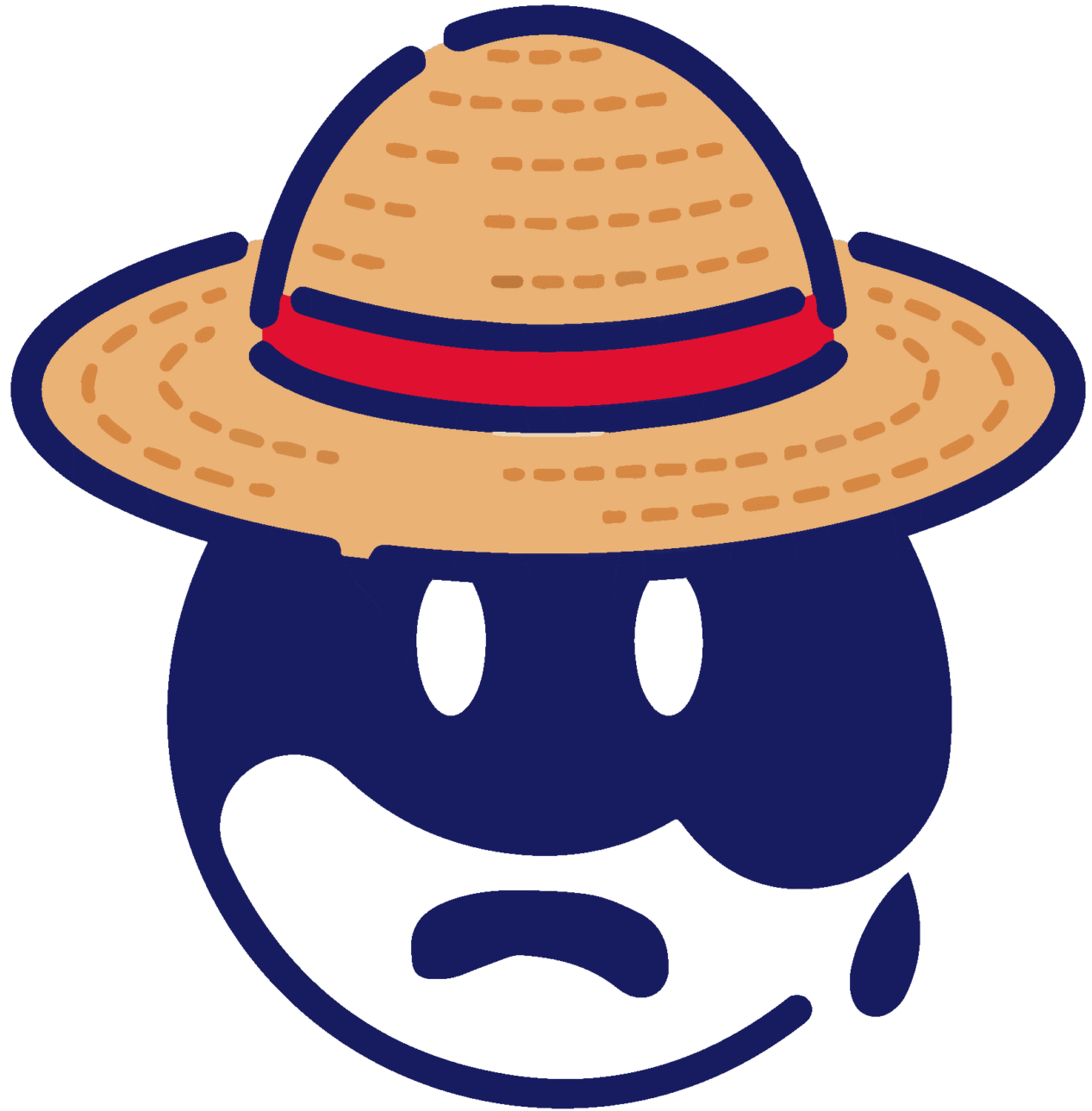

I’ve learned from friends around me that the Chinese New Year nowadays doesn’t feel the same as it used to. Can you tell me why that is?
I think there are several reasons why Chinese New Year doesn’t feel the same as it used to. First, living standards have improved a lot. In the past, many things were only available during the New Year, but now you can buy them anytime, so the sense of rarity and excitement has faded. Second, because of urbanization and people moving around for work, a lot of us don’t live in our hometowns anymore. The close connections and community feeling that made the holiday so lively have become weaker. Third, with digital technology and so many entertainment options, people are used to being on their phones or watching short videos, so even when everyone is together, there isn’t as much real face-to-face interaction. Fourth, a lot of traditional customs have been simplified or restricted, like setting off fireworks or putting up spring couplets, which used to create a strong festive atmosphere. Finally, the fast pace of modern life and work pressure make many people see the New Year as just a short break rather than something to look forward to and prepare for. So in the end, it’s not really that the holiday itself has changed—it’s that society and our lifestyles have changed, and how we express and experience these feelings has changed too.